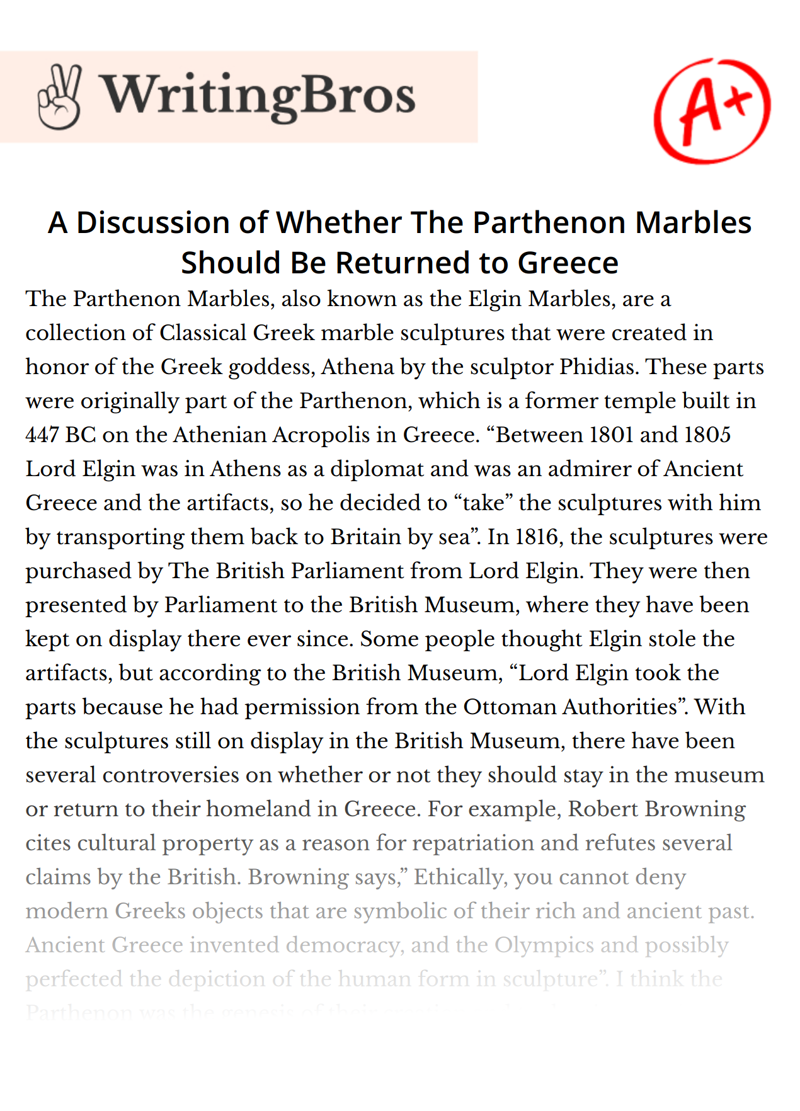A Discussion of Whether The Parthenon Marbles Should Be Returned to Greece

The Parthenon Marbles, also known as the Elgin Marbles, are a collection of Classical Greek marble sculptures that were created in honor of the Greek goddess, Athena by the sculptor Phidias. These parts were originally part of the Parthenon, which is a former temple built in 447 BC on the Athenian Acropolis in Greece. “Between 1801 and 1805 Lord Elgin was in Athens as a diplomat and was an admirer of Ancient Greece and the artifacts, so he decided to “take” the sculptures with him by transporting them back to Britain by sea”. In 1816, the sculptures were purchased by The British Parliament from Lord Elgin. They were then presented by Parliament to the British Museum, where they have been kept on display there ever since. Some people thought Elgin stole the artifacts, but according to the British Museum, “Lord Elgin took the parts because he had permission from the Ottoman Authorities”. With the sculptures still on display in the British Museum, there have been several controversies on whether or not they should stay in the museum or return to their homeland in Greece. For example, Robert Browning cites cultural property as a reason for repatriation and refutes several claims by the British. Browning says,” Ethically, you cannot deny modern Greeks objects that are symbolic of their rich and ancient past.
Ancient Greece invented democracy, and the Olympics and possibly perfected the depiction of the human form in sculpture”. I think the Parthenon was the genesis of their creation and to deprive a nation of its pride and cultural identity is tragic. In the article, Browning asked, “Why to take the marbles from one museum only to put them in another?” Browning also said that,” It would be a different story if they could be replaced on the building” The reason why the marbles can’t be replaced is because during their removal they were damaged. Browning thought that the artifacts would be better understood and appreciated in close proximity to its original site, which is why The Greek Government has declared its intention to build a new museum at the foot of the Acropolis that will have every modern aid to conservation.
In contrast, John Henry Merryman says that the Greeks would not have a legal, moral, or an ethical case for the return of the Marbles to Greece. Merryman’s article clearly states that, “The marbles could never be restored to their original form on the Parthenon and that there is no value in moving them from one museum to another” because they are well cared for on display and easily accessible at the British Museum. Another argument that Merryman makes is that The Marbles are “the cultural heritage of all mankind”. Merryman feels as though that the Greeks think that since it was made in Athens that its geared just towards their culture and they should be the ones that have it. The Hague Convention of 1954 is the charter of cultural internationalism. The charter stated, “cultural property belonging to any people whatsoever” is the “cultural heritage of all mankind”. Merryman’s dichotomy to materialize are the cultural internationalists, who argue the foreign objects in global museums represent a common culture of all mankind, and do not belong to one specific group of people.
The Greeks strongly believe that the marbles present Greek’s national heritage and should therefore be returned. They cite the example of Italy which recently set precedent and returned the Parthenon Marbles in their museum to Greece. According to some Greeks, the marbles were forcefully taken from their country and transported to Britain. Should the Parthenon marbles in Britain be returned to Greece, it would confirm that the British government agrees with this notion. It would also confirm that the marbles belong to a specific community and not all mankind. Other countries including Greece would lay claim to any other artifacts or collections taken from them to Britain. The British government should not at least for now return the marbles until the many other underlying issues are sorted out.
After reading both “The case for the return of the Parthenon Marbles” by Browning and “Who Owns the Elgin Marbles” by Merryman, I feel bad for both situations because both articles made really great points, but I’m going to have to agree with Merryman. He made valid points especially when he talked about The Elgin Marbles presence in The British Museum serving a more important educative function than if they were returned to Greece. I agree with Merryman rather than Browning that the Elgin Marbles should stay in the British Museum because more people benefit from having the art in Great Britain than in Greece. The sculptures should be in a place where people can explore them in the context of art from other places. Honestly, the British have no legal reason to give the marbles back to Greece, and would only concede to do so as a gesture of good will and alliance.
Cite this Essay
To export a reference to this article please select a referencing style below

